Key takeaways:
- Mentorship fosters mutual growth and exploration, creating a collaborative environment where both mentor and mentee learn from each other.
- Emotional support from mentors provides resilience, helping artists navigate self-doubt and challenges in their creative journeys.
- Communication and vulnerability are crucial in mentor-mentee relationships, allowing for deeper understanding and more meaningful exchanges.
- Patience and self-expression are essential in the creative process, as artists learn to embrace their unique voices and perspectives.

Introduction to mentorship
Mentorship is one of those transformative relationships that can shape not only our careers but also our personal growth. I remember my first encounter with a mentor who saw potential in me long before I recognized it myself. Have you ever experienced that pivotal moment when someone believed in you? It’s incredible how a few encouraging words can ignite a desire to push beyond our limits.
In essence, mentorship fosters an environment of learning and exploration. It’s a dynamic exchange where the mentor provides guidance, while the mentee absorbs insights and reflections. I’ve had moments when my mentor’s advice resonated with me deeply, often leading to breakthroughs in my artistic journey. How often do we pause to consider how these interactions influence our decisions and creative processes?
The beauty of mentor-mentee relationships lies in their mutuality. I’ve learned that mentorship is not a one-way street; it involves sharing experiences, challenges, and successes. It’s like a dance where both partners learn from each step. Don’t you think we all have something to teach and learn from one another? In my experience, this collaborative spirit can result in growth that neither of us could have achieved alone.
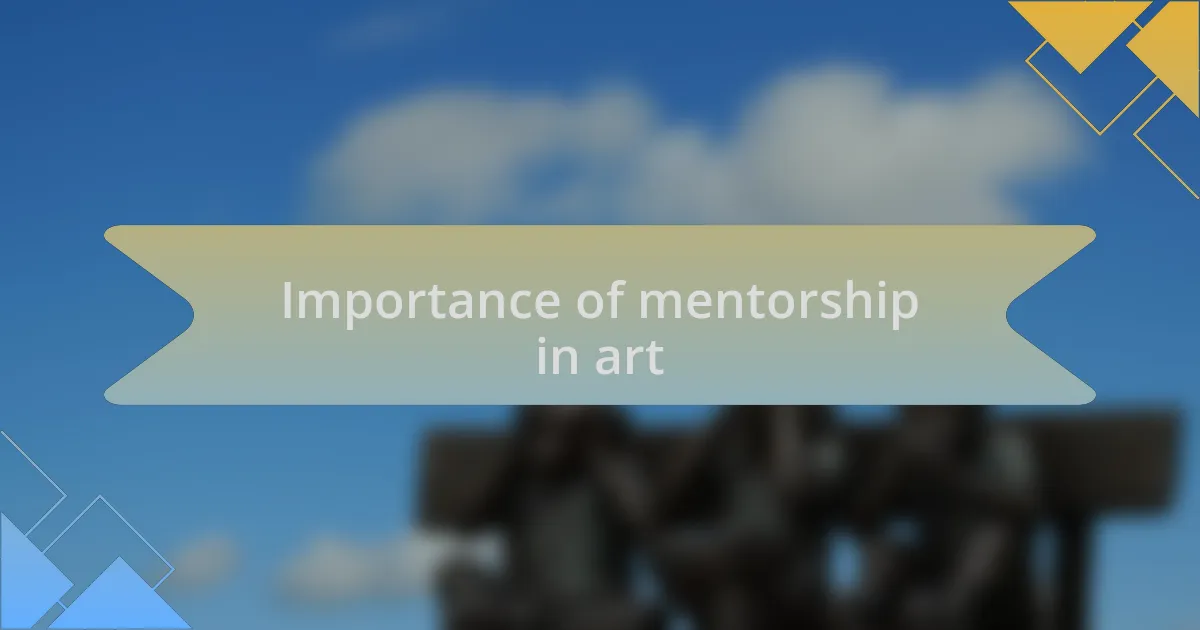
Importance of mentorship in art
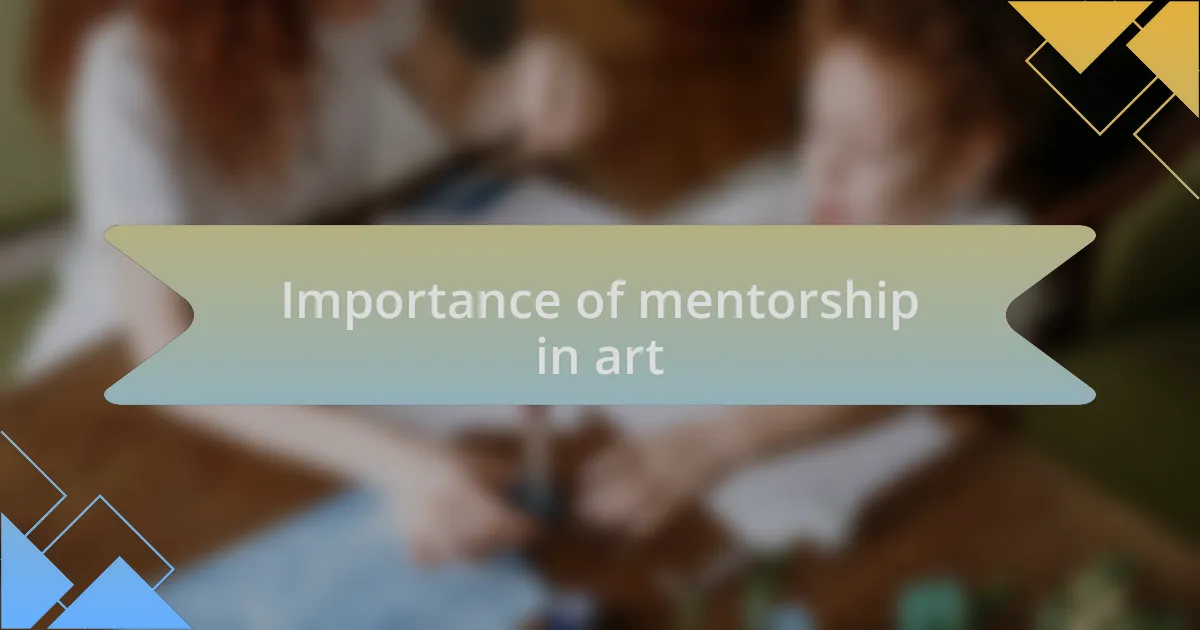
Importance of mentorship in art
Mentorship in art is vital for nurturing talent and creativity. I recall a time when my mentor introduced me to a network of artists that expanded my worldview. This access not only helped me grow artistically but also bolstered my confidence to showcase my work. Have you ever felt the power of community in your creative journey?
The insights gained from a mentor can transform the way we approach our art. I once struggled with a piece that just didn’t feel right. My mentor guided me through the process, suggesting techniques I’d never considered, which not only salvaged the artwork but deeply enhanced my understanding of my medium. How often do we realize that a new perspective can turn frustration into inspiration?
Additionally, mentorship can serve as an essential source of emotional support in the often tumultuous world of art. I have experienced days filled with self-doubt, where my mentor’s reassurance reminded me that many artists face similar struggles. It’s powerful to know we’re not alone in our challenges, isn’t it? This emotional connection makes the mentorship experience invaluable, as it cultivates resilience and encourages us to persevere in our artistic pursuits.
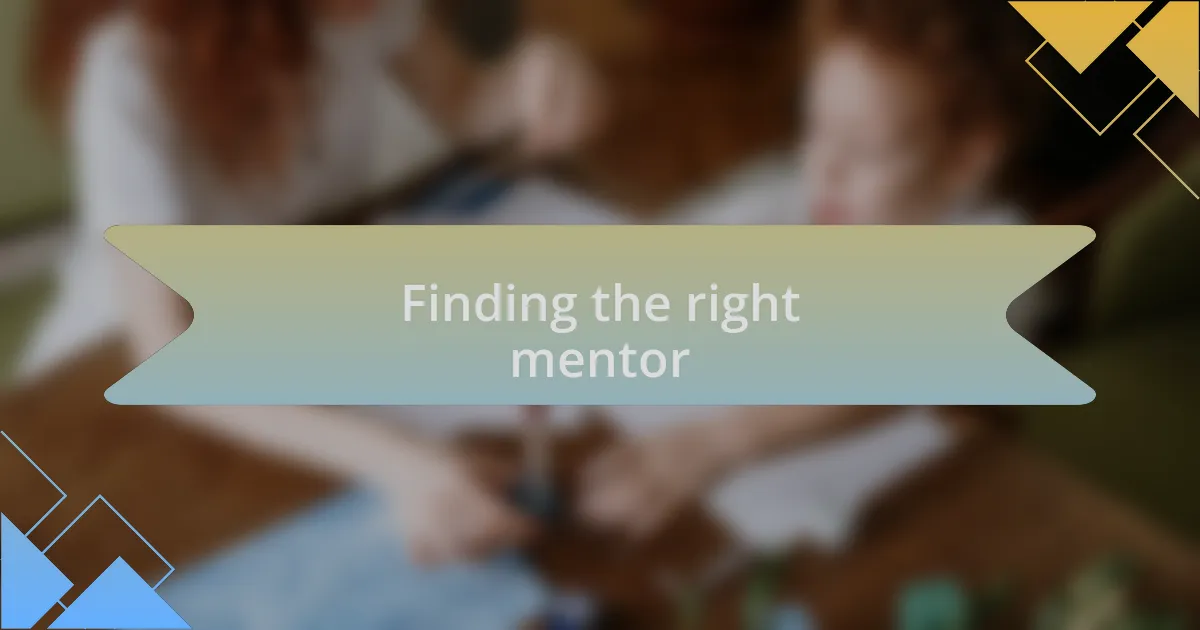
Finding the right mentor
Finding the right mentor can be a transformative experience, and it often requires a bit of searching. During my early days in sculpture, I had a piece that was quite personal to me, yet I hesitated to share it. When I finally connected with a mentor whose artistic style resonated with my vision, everything changed. They didn’t just validate my work; they encouraged me to explore deeper themes, helping me unlock my true potential. Have you ever met someone who just “gets” your creative vision?
Trust and compatibility are crucial in the mentor-mentee relationship. I remember a mentor whose approach felt overly technical for my creative process, leaving me disheartened and confused. It’s essential to find someone whose guidance aligns with your artistic aspirations and ethos. Have you ever felt the frustration of not clicking with a teacher or guide? I discovered that when I chose to work with someone who embraced experimentation as much as I did, my growth intensified and my confidence soared.
Lastly, the dynamics of mentorship thrive on open communication. I learned the hard way that not addressing my needs and questions stifled my progress. When I began to openly share my thoughts and concerns with a supportive mentor, the experience transformed into a collaborative journey. How often do we hold back our thoughts out of fear? Finding the right mentor means creating a space where you can express yourself freely, fostering a relationship built on mutual growth and discovery.
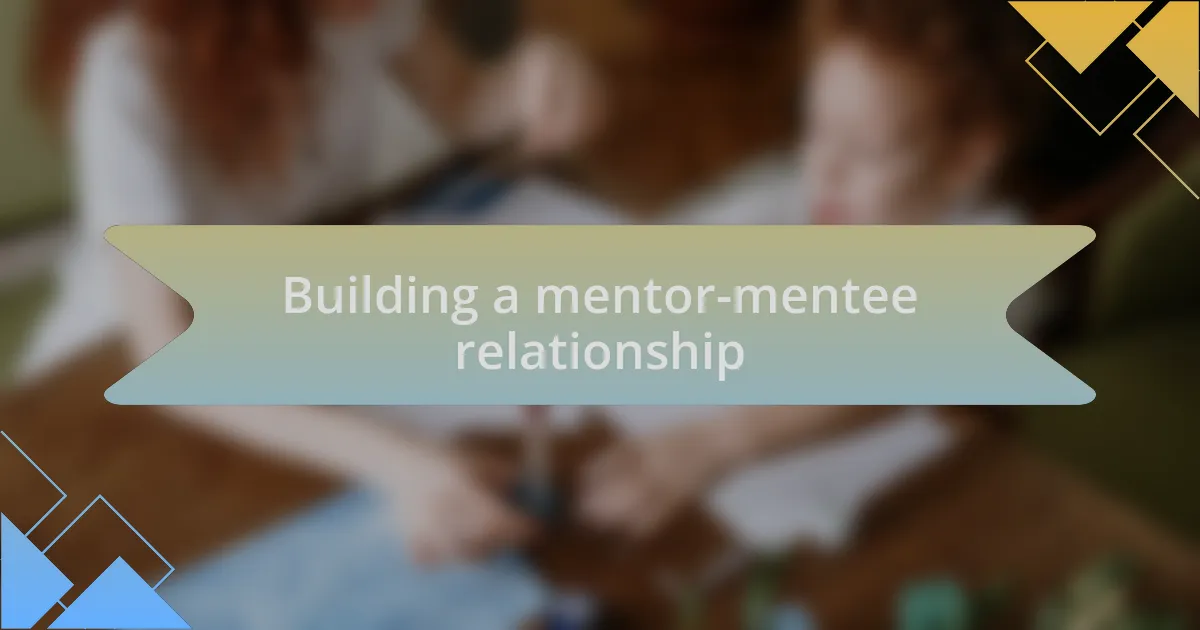
Building a mentor-mentee relationship
Building a strong mentor-mentee relationship often starts with vulnerability. I vividly recall the first time I shared my unfinished sculpture with my mentor. My hands shook, and I felt the weight of my insecurities looming over me. But instead of judgment, I received encouragement and constructive feedback that nurtured my growth. Have you ever allowed yourself to be vulnerable in front of someone you respect?
As the relationship progressed, I found that setting boundaries and expectations was vital. At first, I was hesitant to voice my preferences, worried it might disrupt the flow of mentorship. Eventually, I learned to communicate my artistic goals assertively. This clarity transformed our sessions into meaningful exchanges where I could dive deep into specific challenges. How often do we overlook the importance of expressing our needs in a relationship?
Celebrating small victories together also plays a crucial role in strengthening this bond. Every time I completed a piece that pushed my limits, my mentor was there to recognize my effort. Those moments of shared joy boosted my confidence and made me realize the power of supportive relationships in the creative journey. Have you ever felt that rush of excitement when someone else acknowledges your hard work?
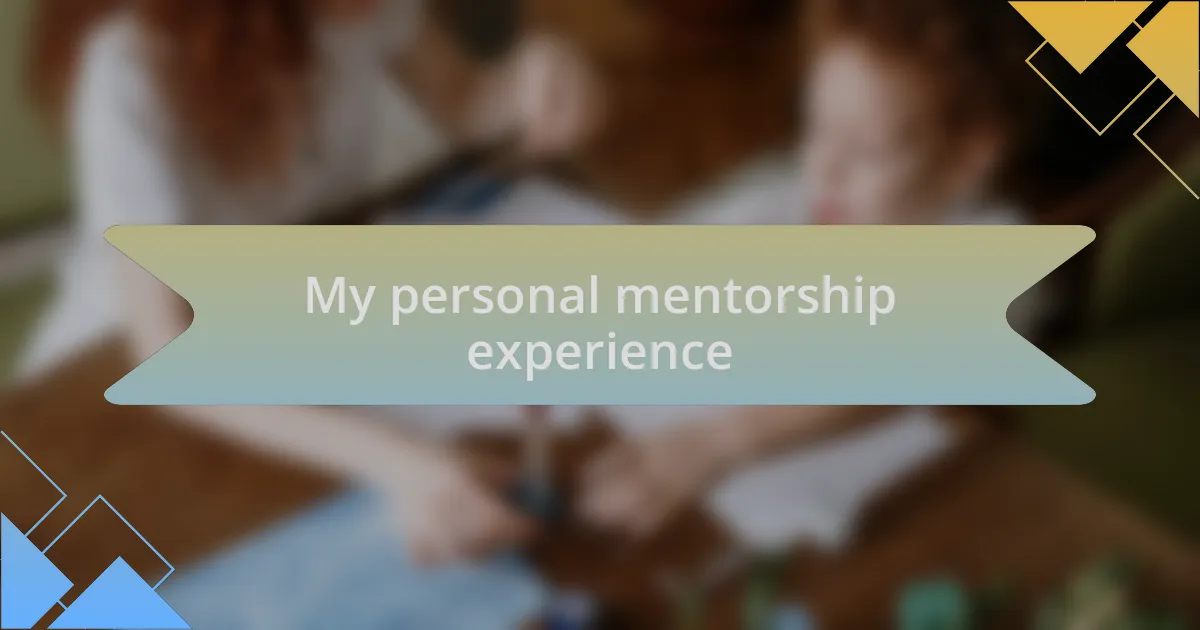
My personal mentorship experience
Reflecting on my personal mentorship experience, I remember a pivotal moment during a particularly challenging project. I was wrestling with a sculpture that just didn’t seem to come together, feeling that familiar frustration creeping in. My mentor sat down with me, guiding me to explore not just the form, but the emotion I wanted to convey. As we discussed my inspiration, I could feel a shift—suddenly, my artistic block was no longer insurmountable. Have you ever had someone help you see your work from a fresh perspective?
Another key aspect of my mentorship was the balance of hands-on guidance and independence. There were times when my mentor stepped back, urging me to experiment and trust my instincts. This was daunting yet liberating, as I learned to navigate my artistic choices. I distinctly remember crafting a piece where I took risks with materials I had never used before. The excitement of finding my own voice in that process was exhilarating. Isn’t it empowering to realize that sometimes the best way to learn is to make mistakes?
Over time, I started to understand the deeper emotional support my mentor provided. Beyond just technical advice, there were heartfelt conversations about fears, aspirations, and the inevitable self-doubt that artists face. Once, after feeling particularly defeated, my mentor shared their own struggles during their creative journey, and it made me feel less alone. This vulnerability helped me cultivate resilience within myself. How important is it to know that others have walked a similar path?
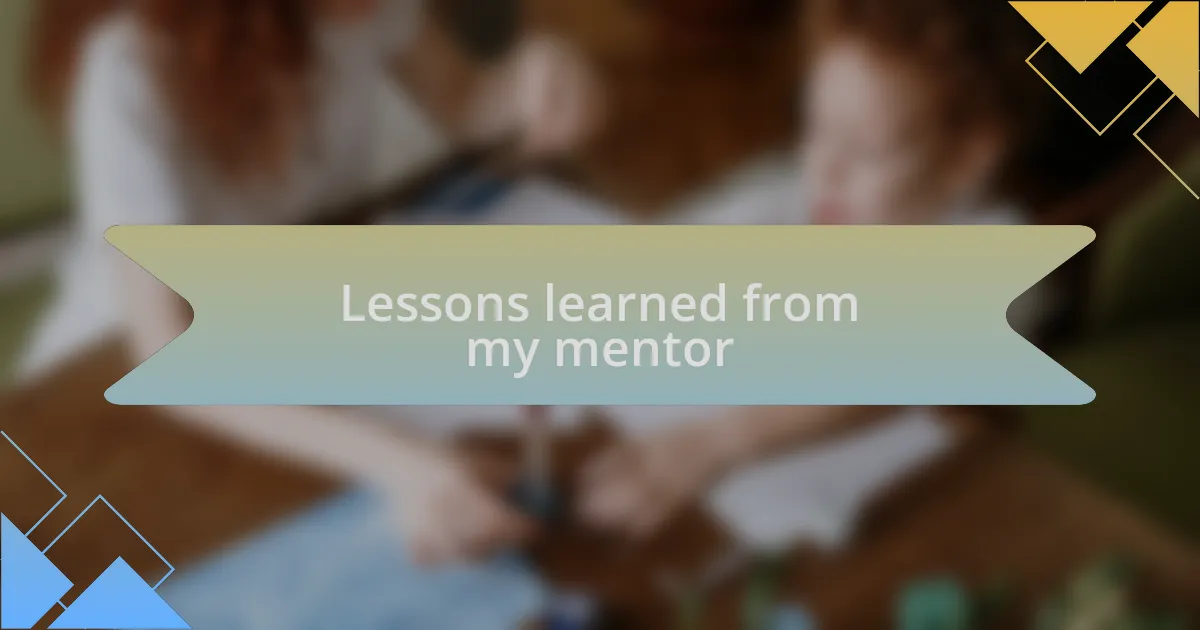
Lessons learned from my mentor
One of the most significant lessons my mentor taught me was the importance of patience in the creative process. There were times when I wanted to rush through my work, convinced that speed would equate to productivity, but my mentor gently reminded me that true artistry often flourishes with time. I vividly recall a moment when I was so eager to finish a sculpture that I nearly compromised its essence. Pausing to reflect allowed me to deepen my connection to the piece. Have you ever found that the best results sometimes come when you take a step back?
Another valuable insight came from my mentor’s approach to critique. Instead of merely pointing out flaws, they fostered a dialogue where I could express my thoughts on each piece. After presenting a sculpture I was uncertain about, my mentor asked, “What do you love most about this work?” This question shifted my focus from merely waiting for judgment to actively engaging with my own artistic perspective. It was a revelation—recognizing my own vision became instrumental in determining what needed to change. Isn’t it incredible how empowering it can be to articulate your own feelings about your work?
Finally, my mentor instilled in me the idea that every artist has a unique voice that deserves to be heard. I remember feeling pressure to conform to popular styles or trends, but my mentor encouraged me to embrace my individuality. They often referenced their early struggles to find their own identity, sharing how that journey led them to artistry that resonated with authenticity. This was a turning point for me—it taught me that true expression comes not from imitation but from embracing who I am. How liberating is it when we allow ourselves to be unapologetically us?